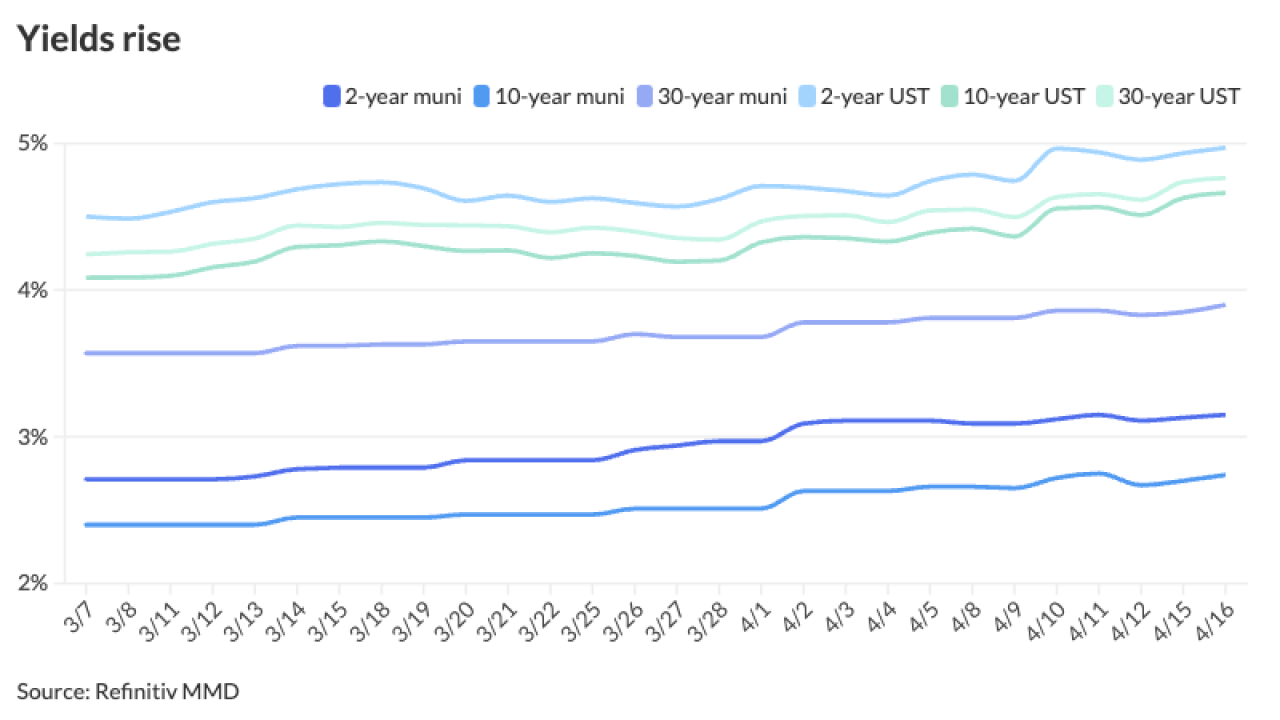The municipal market was mixed yesterday, opening up what will be another new-issue driven week ahead of the Thanksgiving holiday.
“We’re pretty flat right now, opening things up,” a trader in New York said. “There’s some decent activity out there for a Monday, but eyes are going to be on the new issues again this week. We’ve got a pretty chunky calendar out there this week, ahead of the holiday next week, when things are going to naturally slow down, and really just get slower and slower as we head to the end of the year. I’m not too sure we’ll see a week like this again before next year.”
“There’s some movement in spots, a bit better in places, a bit worse in others,” a trader in Los Angeles said. “But it’s spotty. It’s mostly unchanged out there, but you could call it mixed. Either way, it’s not definitively firmer or weaker. I’d call it mostly flat, and either up or down a basis point in spots.”
The Treasury market showed gains yesterday. The yield on the benchmark 10-year note opened at 3.42% and finished at 3.35%. The yield on the two-year note opened at 0.80% and finished at 0.78%. The yield on the 30-year bond finished at 4.27% after opening at 4.35%.
Yesterday’s Municipal Market Data triple-A scale yielded 2.93% in 10 years and 3.80% in 20 years, after levels of 2.95% and 3.82%, respectively, on Friday. The scale yielded 4.29% in 30 years yesterday, after Friday’s level of 4.26%.
As of Friday’s close, the triple-A muni scale in 10 years was at 85.8% of comparable Treasuries, according to MMD, while 30-year munis were 97.5% of comparable Treasuries. Also, as of Friday’s close, 30-year tax-exempt triple-A rated general obligation bonds were at 101.4% of the comparable London Interbank Offered Rate.
On tap this week is an estimated $11.93 billion in new long-term volume, according to Ipreo LLC and The Bond Buyer.
The Empire State Development Corp. will step into the spotlight with $1.5 billion of state personal income tax revenue bonds for the New York State Urban Development Corp., including $775.6 million of taxable Build America Bonds in Series 2009E.
Besides the BAB series, the structure will also include $501.5 million of Series 2009 C bonds, as well as $224.1 million of traditional taxable bonds in Series 2009 D.
The taxable bonds will mature from 2010 to 2039, while the tax-exempt debt will mature from 2010 to 2019. The deal, which is rated AAA by Standard & Poor’s and AA-minus by Fitch Ratings, is planned for pricing by Goldman, Sachs & Co. today, after a two-day retail order period that began last Friday for the tax-exempt portion. Retail pricing information was not available.
Meanwhile, the California State Public Works Board is readying a $1.32 billion revenue sale, which also includes $250 million of BABs.
The tax-exempt bonds, which total $1.09 billion, are scheduled to be priced by Wachovia Bank NA on Thursday, following a retail order period tomorrow, and are structured to mature from 2010 to 2034. The $250 million of BABs will be priced by Jefferies & Co., also on Thursday, and will likely mature in a single term bond due in 2034.
The tax-exempt bonds and BABs in Series I are rated Baa2 by Moody’s Investors Service, AA-minus by Standard & Poor’s, and BBB-minus by Fitch. Tax-exempt bonds in Series J are rated A1 by Moody’s, A-minus by Standard & Poor’s, and BBB-minus by Fitch.
In a weekly report, Matt Fabian, managing director at Municipal Market Advisors, wrote that “from a market perspective, last week was fairly steady.”
“Although credit spreads have continued to widen for longer bonds, earlier maturities have attracted better demand and are actually recording some spread compression,” Fabian wrote. “This was not due to improvements by the bond insurers, because while Assured Guaranty avoided downgrades below the Aa level by Moody’s, MBIA had another poor earnings call and Ambac may be forced to pursue bankruptcy in the near term.
“Fears of state and local credit trauma are worsening across the board, although there remains no evidence of actual impairment among safe sector paper,” Fabian continued. “By contrast, the Florida land-secured sector is falling apart; last week, 62 districts disclosed either a payment default (33) or reserve fund draw (29) with respect to their Nov. 1 interest payment. These numbers should continue to rise in the next few weeks.”
As for this week, Fabian wrote that “large mutual fund inflows will likely drive still better demand for shorter paper, while credit spreads may continue to sag, in particular for high yield.”
In economic data released yesterday, retail sales rose 1.4% in October, and purchases excluding autos increased 0.2% for the month. Economists polled by Thomson Reuters expected retail sales to increase 0.9% in October and for sales excluding autos to increase 0.4%. Sales in September were revised to a 2.3% decline. Sales excluding autos were revised to a 0.4% gain.
Business inventories declined 0.4% in September, the 13th consecutive monthly drop. The August inventories decline was revised to a 1.6% drop. Economists expected business inventories to fall 0.7% in September, according to the median estimate provided by Thomson Reuters.
The Empire State Manufacturing Survey showed “conditions for New York manufacturers improved in November, but at a somewhat slower pace than in October,” as the general business conditions index decreased to 23.51 in the month from 34.57 in October. Economists surveyed by Thomson Reuters had expected the index would be 30.00.





